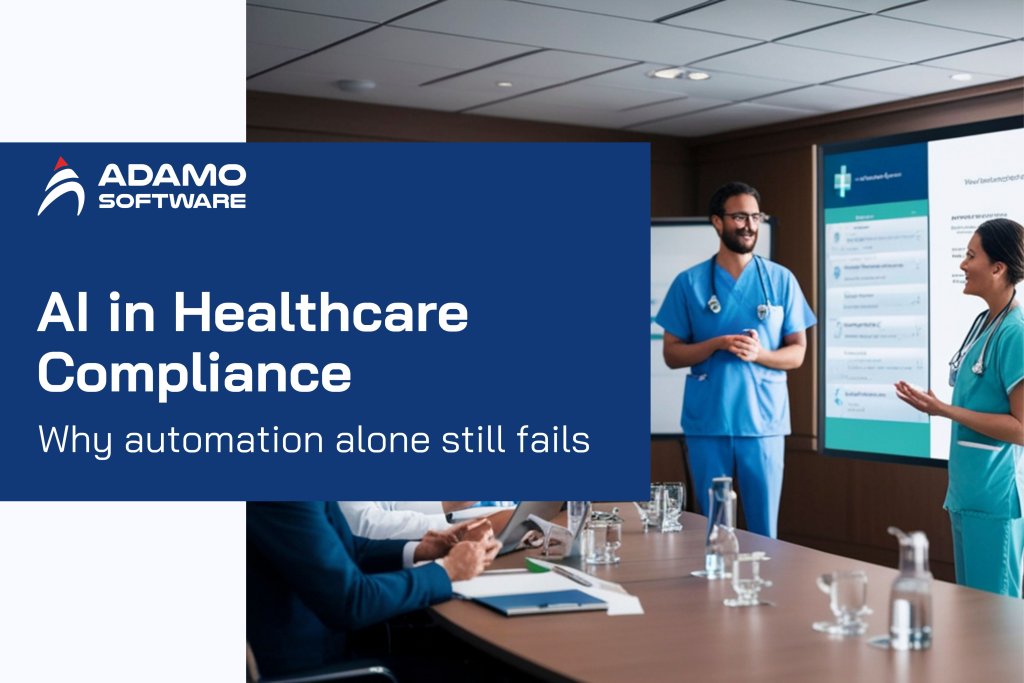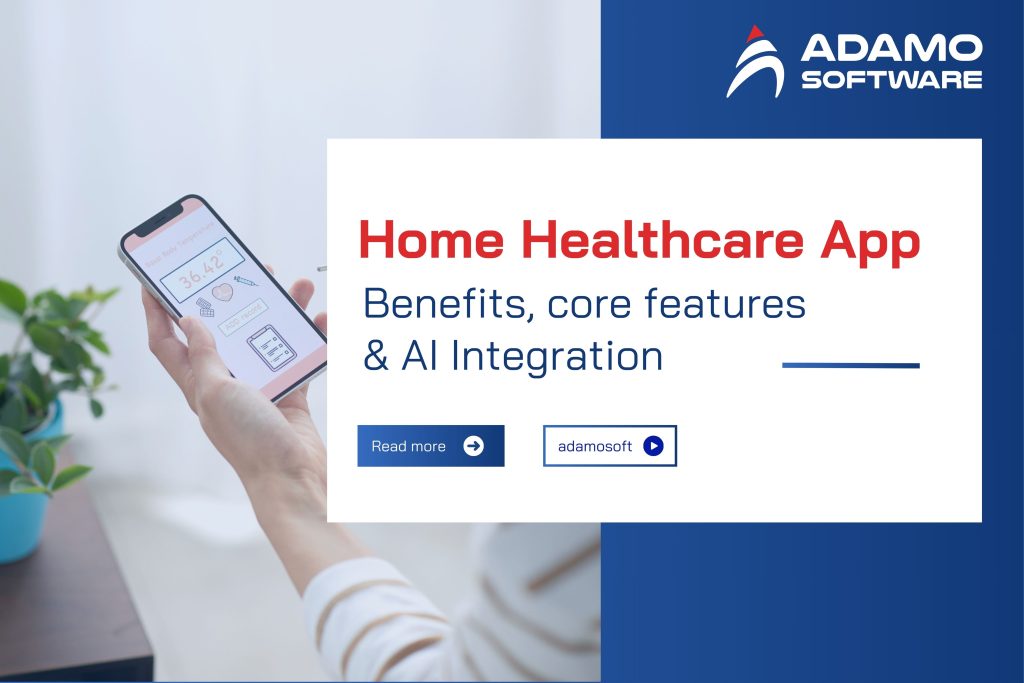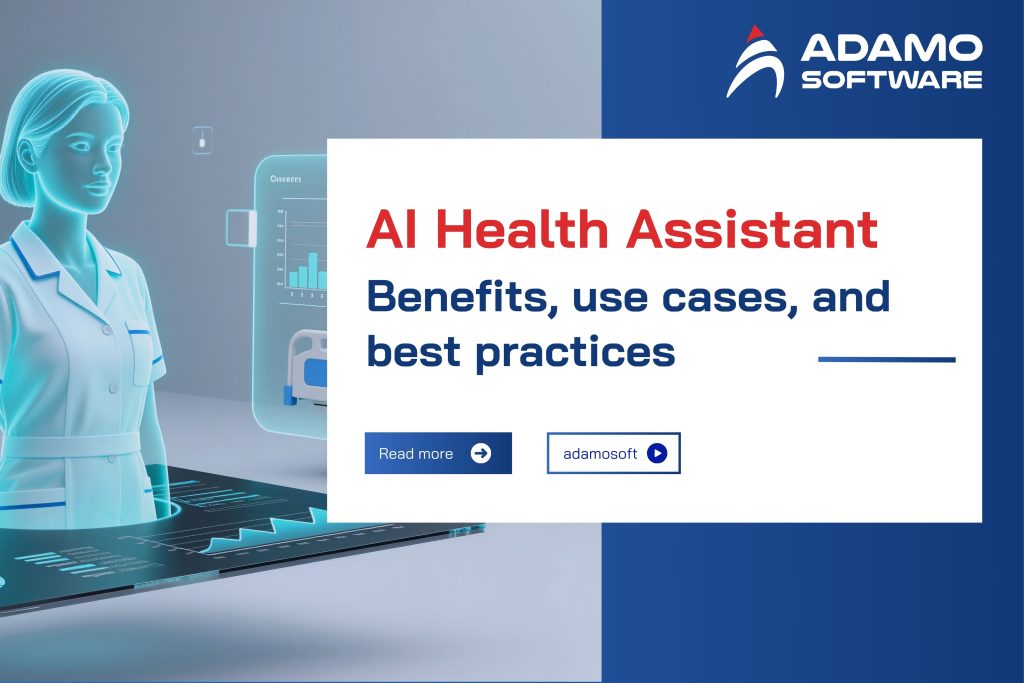AI in personalized medicine: Key Benefits and Use Cases
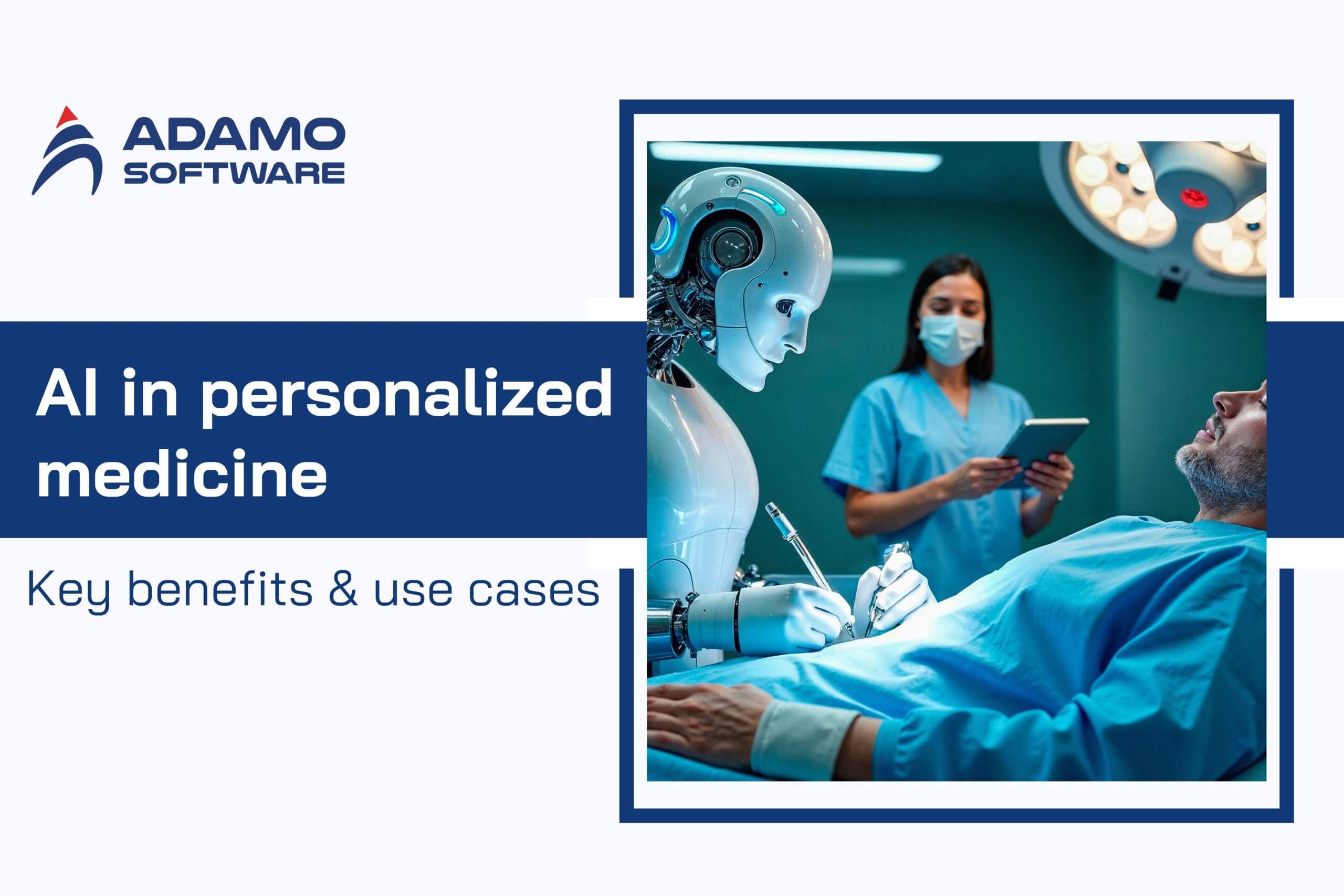
Transform healthcare with AI in personalized medicine. Discover proven use cases, benefits, and how to develop AI solutions that deliver real impact.
AI-driven personalized medicine is no longer futuristic. It has become a standard in modern healthcare. For healthcare providers and tech companies, this shift is more than technology. It is a competitive necessity. By combining patient data, advanced analytics, and machine learning, AI makes treatments more precise. It also ensures care is genuinely tailored to each patient’s unique needs.
Investing in AI integration for personalized healthcare solutions opens doors for healthcare technology partners.
In this article, we’ll explore:
- The emergence of AI in personalized medicine
- Benefits of Applying AI-driven personalized Treatment
- Top 5 Real-world Use Cases of AI for Precision Medicine
Whether you’re a healthcare provider, a medtech company, or a software development partner, understanding how to leverage AI in personalized medicine could be the key to your next breakthrough.
I. The emergence of AI in Personalized Medicine
The adoption of AI in personalized medicine is transforming healthcare delivery for patients worldwide. Instead of working with disconnected pieces of information, AI gives healthcare providers the bigger picture, faster. By pulling together data, spotting risks early, and even helping interpret medical images, AI makes care more precise and personal.
A recent Accenture survey found that 84% of healthcare executives believe AI will significantly accelerate diagnosis and treatment over the next three years.
Key points where AI is transforming outcomes dramatically:
- Data Integration and Analysis: turning scattered patient information into a single, useful view.
- Predictive Analytics: helping providers see what’s coming next in a patient’s health journey.
- Real-time Monitoring and Decision Support: catching changes in health before they escalate.
- Image Recognition and Diagnosis: Detecting details beyond human vision.
1. Data Integration and Analysis
Healthcare data is everywhere—genetic test results in one database, MRI scans in another, and years of clinical notes in an EHR system. AI can bring those silos together. By connecting genetic profiles, imaging data, electronic health records, and wearable device metrics, providers can see a patient’s health story as a whole, not in fragments.
One oncology clinic, for example, used an AI platform to integrate thousands of patient records and imaging files. Within weeks, clinicians identified patterns in treatment response that had been invisible before—directly influencing how they tailored cancer therapies.
2. Predictive Analytics
One of the most exciting uses of AI in personalized medicine is its knack for predicting what might happen next. With enough historical data, AI can highlight early warning signs, predict how an illness might develop, and suggest how likely a patient is to respond to a particular therapy.
According to Allina Health’s 2024 Annual Research Report, the organization applied machine learning algorithms to predict the risk of readmission within 30 days after spine surgery for osteoporosis patients. This study utilized data from electronic health records (EHRs) to develop a predictive model aimed at identifying high-risk patients and enabling timely interventions to reduce readmission rates.
For providers, that’s not just a statistic. This fewer emergency calls, less patient distress, and more time to focus on proactive care.
3. Real-time Monitoring and Decision Support
Wearable health tech has become mainstream, but without AI, the raw data is… numbers. AI changes that by continuously analyzing the data stream—heart rate, oxygen levels, activity patterns—and flagging anomalies in real time.
This ability can profoundly improve the lives of those managing chronic illnesses. Patients with heart conditions, for example, can receive intervention minutes after an abnormal reading, not hours or days later.
You can explore more about How can AI be used in healthcare: From smarter diagnoses to safer treatments here.
Explore Our Tailor-made Software Development Solutions
We are confident in providing end-to-end software development services from fully-functioned prototype to design, MVP development and deployment.
4. Image Recognition and Diagnosis
Radiology teams often have to review hundreds of images daily, and even the most skilled eyes can miss a subtle detail after work hours. Deep learning algorithms can analyze scans—X-rays, MRIs, CT images—against massive medical image datasets and point out patterns that deserve a closer look.
In one Stanford-led study, AI outperformed the average radiologist in diagnosing pneumonia from chest X-rays, hitting 92% accuracy compared to 88%. That small advantage can lead to detecting a disease early, which can change everything.
II. Benefits of Applying AI-driven Personalized Treatment
In healthcare, it’s a simple truth: no two patients are exactly the same. Two people might have the same diagnosis but respond completely differently to the same treatment plan. That variation isn’t random—it comes from a mix of genetic makeup, physical characteristics, daily habits, and even the environment in which they live.
This is where AI in personalized medicine has become a turning point. Instead of applying a one-size-fits-all approach, AI platforms can analyze and connect data points from multiple sources such as genomes, lab results, lifestyle trackers, imaging scans use that insight to guide a care plan designed for one specific patient, not just “the average patient.”
Key factors shaping this level of treatment precision include:
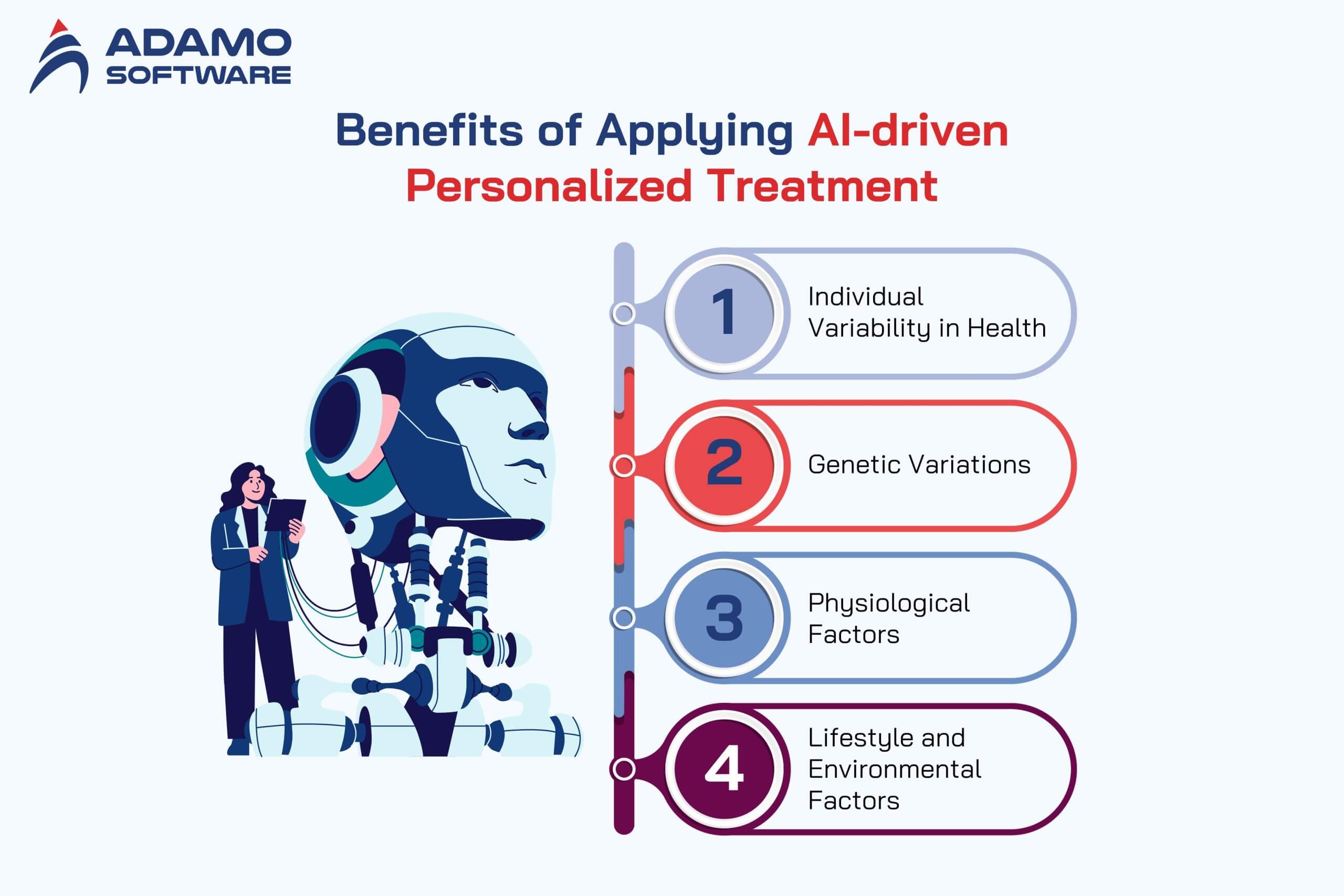
- Individual Variability in Health: the full spectrum of personal differences influencing medical outcomes.
- Genetic Variations: understanding how DNA impacts how drugs are absorbed, metabolized, and cleared.
- Physiological Factors: accounting for age, sex, body composition, and organ function.
- Lifestyle and Environmental Factors: recognizing the role of diet, activity levels, and environmental exposures.
1. Individual Variability in Health
Every patient brings a unique combination of biology and life experience into the clinic. Two people on the same medication regimen can have very different results. AI helps make sense of these differences by scanning vast amounts of clinical and lifestyle data to spot trends that aren’t obvious at the bedside.
One hospital network recently used AI analytics to review thousands of treatment records for heart failure patients. The system found a small subgroup that consistently responded better to a particular therapy—something the care teams hadn’t noticed in routine practice.
2. Genetic Variations
Genes influence everything from how quickly a drug is broken down to whether it might trigger side effects. This is critical knowledge in pharmacogenomics—yet analyzing it manually for each patient is impractical. AI changes that by matching genetic profiles to known drug response patterns in minutes.
For example, patients with specific CYP450 enzyme variants metabolize some antidepressants more slowly, increasing the risk of side effects. An AI-enabled prescribing system can flag this instantly, prompting clinicians to choose an alternative before giving the first dose.
3.Physiological Factors
Age, sex, body fat distribution, and organ health determine an optimal treatment plan. An older patient with reduced kidney function, for instance, may require a much lower drug dose than a younger, healthier counterpart.
AI can integrate lab values, imaging results, and demographic details to recommend dosage adjustments or alternative therapies—avoiding both under-treatment and toxic overdosing.
4. Lifestyle and Environmental Factors
Daily routines and environmental exposures can amplify or undermine medical treatments. Poor diet, lack of exercise, smoking, alcohol use, and air quality all leave a measurable imprint on health outcomes.
AI systems can flag when these factors might work against a prescribed therapy by combining wearable device data, patient-reported habits, and local environmental metrics. Care teams can then intervene—sometimes with small, specific lifestyle recommendations—that make the medical plan far more effective.
III. Top 5 Real-world use cases of AI for precision medicine
Watch on YouTube: https://www.youtube.com/watch?v=JVDp1EzT-qI&t=1s
AI in personalized medicine is no longer a theoretical concept — it has proven to be effective in hospitals, research centers, and biopharmaceutical companies around the world.
AI-based solutions help doctors and healthcare providers deliver more precise treatments, save time, and are easy to scale.
Here are five notable real-world examples:
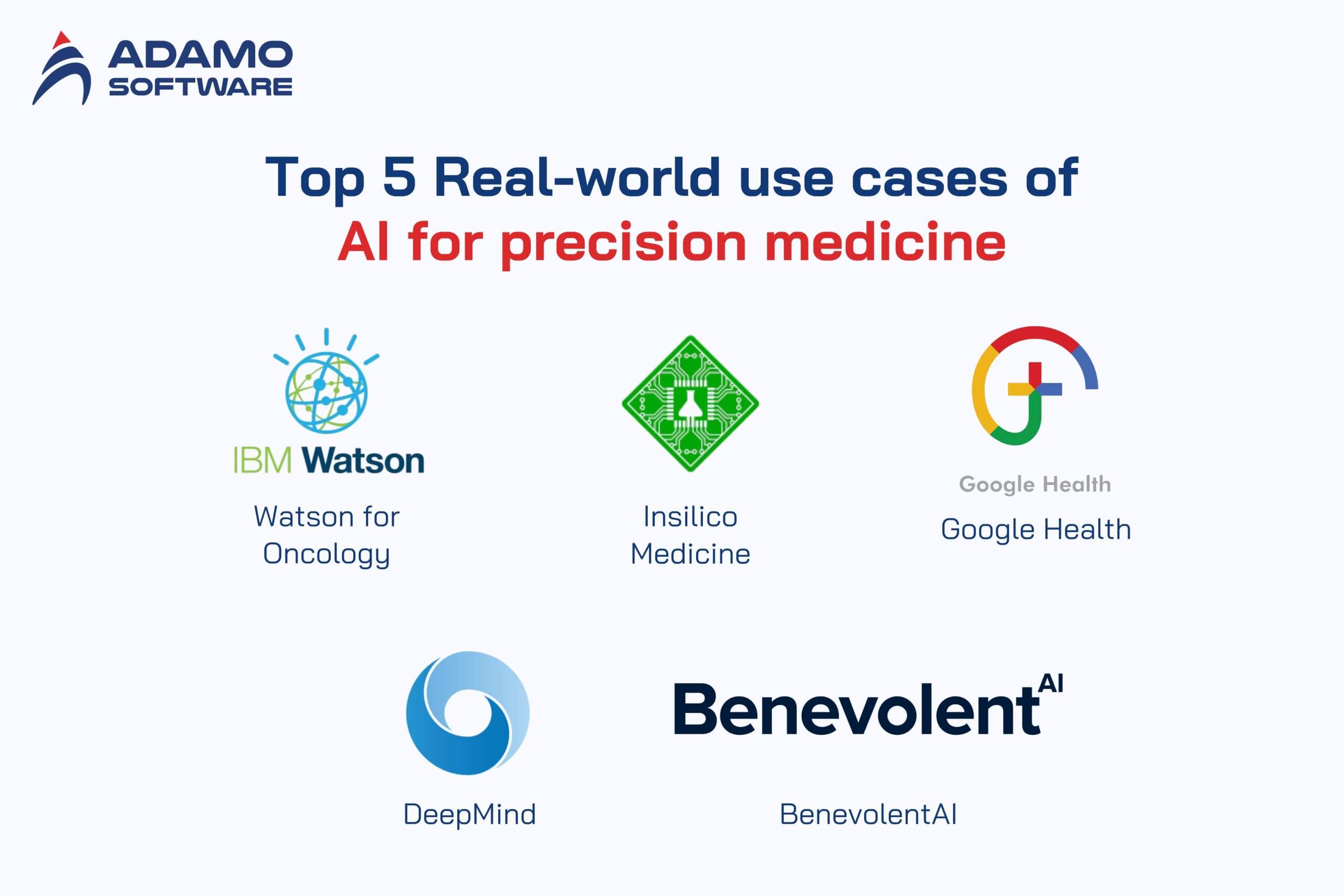
- Watson for Oncology: Analyzes patient data, recommends treatment regimens quickly, and has supported over 10,000 cases in China.
- Insilico Medicine: Uses AI to rapidly design drugs, identify safe fibrosis candidates, and prepare for clinical trials.
- Google Health: Employs AI models to accurately diagnose breast cancer, improve early detection, and reduce errors.
- DeepMind: AI predicts patient health decline and supports early diagnosis and personalized treatment.
- BenevolentAI: AI shortens drug development time and creates precision medicine solutions based on genetic data.
1. Watson for Oncology
One of the best examples is IBM’s Watson for Oncology. This tool can “read” medical records, test results, and treatment histories, then suggest appropriate treatment regimens for each patient. In some hospitals in China, Watson has supported more than 10,000 cases, taking less than a minute to make treatment recommendations.
2. Insilico Medicine
Insilico Medicine has used generative AI to design potential drug compounds in just a few months, instead of years, as in the traditional way. They discovered a fibrosis drug candidate with a good safety profile in mouse models—a breakthrough on the way to phase II clinical trials.
3. Google Health
Google Health has developed deep learning models that outperform human radiologists in detecting breast cancer from mammograms, reducing false positives and negatives. Its AI models improved early cancer detection rates in trials and helped radiologists make more accurate, timely diagnoses.
4. DeepMind
DeepMind is a pioneer in personalized medicine in the UK, using deep learning technology to work with healthcare organizations to analyze patient data and develop individualized treatment plans. DeepMind’s AI algorithms are able to predict how a patient’s condition will deteriorate, helping healthcare professionals intervene in a timely manner.
This technology has brought significant breakthroughs in accurate diagnosis, especially in oncology and nephrology, and shortened the time to detection of diseases.
5. BenevolentAI
BenevolentAI uses artificial intelligence to accelerate the process of finding new drugs and developing personalized medicine. The company analyses data from clinical trials, genetic information and medical literature to identify potential treatment targets and drug candidates.
By 2025, BenevolentAI will partner with major pharmaceutical companies to develop drugs tailored to the genetic makeup of each patient group, especially in the treatment of cancer and Parkinson’s. Thanks to AI, drug research time and costs are shortened, helping precision medicine reach more patients.
IV. Partner with Adamo Software to leverage AI in healthcare
Adamo Software has a team of experts who are knowledgeable about both AI technology and the specifics of the healthcare industry, and also have practical experience with many projects for global customers. Adamo ensures personalized, secure and scalable solutions from health data analysis systems, medical consulting chatbots, and diagnostic support platforms.

We are not simply a healthcare software developer, but a companion partner, helping healthcare organizations maximize AI’s power to improve patient care quality and optimize operational efficiency. Contact us today!
FAQs
1. What are the biggest challenges when applying AI to precision medicine?
Implementing AI in personalized medicine is not easy. Common problems include inconsistent data, the risk of patient information disclosure, and algorithmic bias. A good solution is to cooperate with a reputable AI developer to ensure the system complies with standards and is transparent.
2. How is patient data collected and secured when training AI?
Data sources often come from electronic health records, genetic testing, and medical imaging. Trusted AI solution providers will process, anonymize, and store data in compliance with privacy regulations such as HIPAA or GDPR.
3. What are the ethical and legal considerations when applying AI in precision medicine?
When applying AI in personalized medicine, transparency, fairness, and explicit patient consent are required. Therefore, healthcare organizations should choose a solution that is designed with results interpretability and regulatory compliance to ensure trust and regulatory approval.



